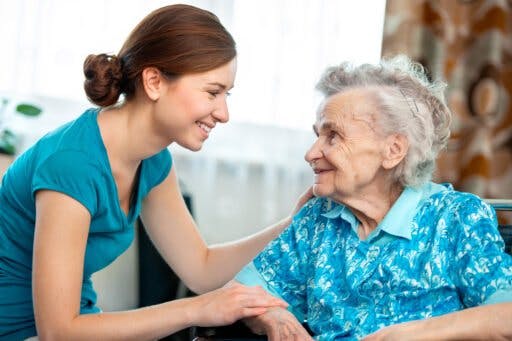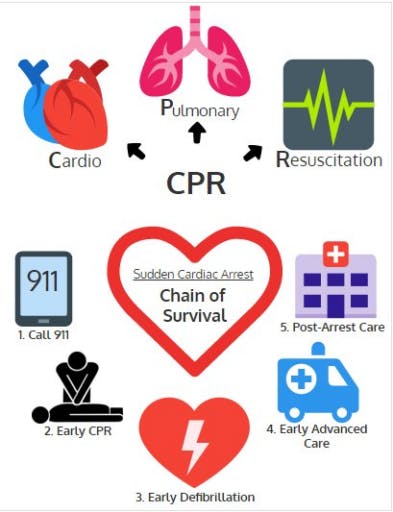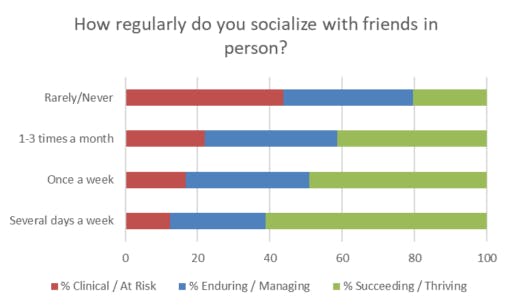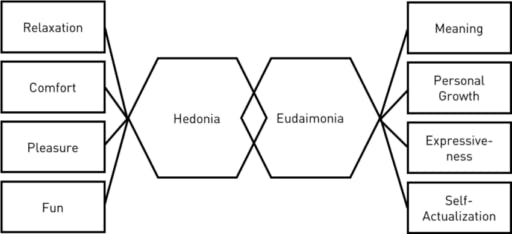Why Caregiving is Rewarding
With nearly 3.5 million caregivers employed, and a 33% predicted job outlook rate over the next year, caregiving is one of the fastest-growing …

With nearly 3.5 million caregivers employed, and a 33% predicted job outlook rate over the next year, caregiving is one of the fastest-growing professions in the United States.
However, the personal and professional rewards of being a caregiver still come with challenges unique to the industry—so from where do caregivers find the motivation to continue serving families? Time and again, these professionals say that being a caregiver for someone in need can be rewarding for them in multiple ways—and these aspects unique to the caregiving profession are what continually inspires them.
Whether you’re just starting out in the workforce, or are looking for a career change, being a caregiver is a unique way to serve others. If you plan to progress and grow within the senior caregiving career, learn more about the personal and professional elements that make caregiving such a rewarding experience.
What Professional Rewards Do You Get from Being a Caregiver?
Career opportunities in the caregiving profession are receiving greater support—both in terms of training and investment. As the senior and older adult population sharply increases, America is investing in its care providers tremendously.
“When you invest in a caregiver, that caregiver is doing a job that allows somebody else to also go back into the economy and to stimulate the economy and be part of our recovery,” says Tina Tchen, president and CEO of Time’s Up. “Building this infrastructure now is critically important.”
The potential expansion of bills like the Child and Dependent Care Credit allow working Americans with seniors in their families that require full-time assistance to better pay for that care. That’s yet another reason why the number of in-home caregivers is expected to grow by nearly 1.2 million by 2029.
For caregivers, this is good news and compounds an already rewarding career choice where personal rewards are often tied into its professional ones. When you work with the right company and client, you’ll likely also enjoy:
- The exceptional hands-on training
- The comprehensive pay and benefits
- The flexibility of hours and schedules
Let’s take a deeper look at each of these professional benefits of being a caregiver.
Reason #1: You Learn Practical Skills That Can Be Useful
As a caregiver, you’ll be trained and certified to understand specific health symptoms and respond in emergencies—and you never know when practical skills you learn on the job may come in handy in real life.
An excellent example of using your practical skills from your caregiving expertise is bystander CPR. Bystander CPR is more common than most people may realize! It is an emergency early-intervention CPR administered by someone close to the situation physically but is not part of the official response team for emergency services.
This is especially vital because when a person suffers from cardiac arrest, for example—which requires CPR—they only have a 12% chance of survival since they’re outside a hospital environment. However, with bystander CPR, their survival chances are drastically increased to 75%.
Reason #2: You’ll Receive Competitive Pay and Excellent Benefits
Agencies that match disability and senior caregivers up with elderly patients who need assistance want to ensure that everybody is happy. This includes their caregiving employees, who should receive excellent benefits, such as:
- Competitive pay, paid orientation, specialty training, job security, and paid sick leave
- Flexible scheduling with part-time and full-time shifts that vary between 4 and 12 hours
- Bonus opportunities, like referral programs and pay bonuses
- Free training for First Aid, CPR, and COVID-19
And job security is also better than ever: Caregiving requires a lot of hands-on work and mental stimulation, which is why they’re one of the most competitive and high-demand career paths in the United States. With demand only increasing, there will always be a need for high-quality caregivers.
Reason #3: You Can Enjoy a Flexible Schedule Where Each Day is Different
When you settle into a routine and get to know the person you serve and their family, joining them each day stops feeling like you’re going to work. The best part? It’s much different than working in a cubicle, so the flexibility of a caregiving schedule might be better suited for those who don’t want to adapt to a 9-5 job!
Instead, your day might start with joining them for a meal and catching up on the latest news, which brings you that sense of spending time with somebody you can truly enjoy. You’re also not tied to one location all day: Disabled and elderly patients who require caregivers need somebody to run errands for them, like cooking meals, sending mail, doing laundry, or grocery shopping, and basic household chores.
Many people also need personal care services where they may need to be taken to medical appointments and physical therapy. As a caregiver, you can also decide what days and hours work best for you since most caregiving agencies offer 24/7 care.
What Personal Rewards Do You Get from Being a Caregiver?

One of the reasons why caregiving positions have so many professional rewards for potential caregivers is that it’s still one of the most demanding jobs you can commit to.
Caring for a senior or person with a disability who needs assistance throughout the day can prove to be challenging, but it can also provide meaningful personal rewards.
“We’re not saying that family caregiving can’t be stressful, but there’s a notion that it’s so stressful that it causes deteriorating health and increased mortality,” says David Roth, M.A., Ph.D., the first author of a study that analyzes the health benefits of providing caregiving services. “Caregiving, if done right, can actually be an extremely beneficial, healthy activity that enhances your life because you’re engaging in prosocial behavior.”
As you know, there are many reasons that you might go into caregiving:
- You can learn practical skills
- You can receive great benefits
- You get to set your schedule
But aside from these reasons, you can take the load off of family caregivers and other family members who may be dedicating hours of time assisting their loved ones.
Additionally, caregiving offers tons of benefits that can positively affect your mental and physical condition, such as making a difference in someone’s life, connecting with others daily, and enhancing your worldview.
Reason #1: You’re Making a Difference In Someone’s Life
There’s a reason that career paths like nursing, caregiving, and teaching are often coined as some of the most rewarding jobs in the world: Because these professionals are constantly giving back to their communities, whether it’s through respite care, working with the elderly, or teaching children.
As humans, we develop a specific type of satisfaction through caring for somebody in a time of need: One study has found that providing support to others activates a pathway in the brain that boosts your sense of well-being.
Additionally, activity in the amygdala—which hosts fear and stress responses—is lowered. Another study says that engaging in prosocial actions helps meet our basic psychological needs for emotional support and feeling close to others.
So when you do something as selfless as dedicating your time to another person’s livelihood, you receive a type of personal satisfaction that may even change your perspective on life!
Reason #2: You Connect With Others Daily

Humans have a natural need to connect—so much so that our mental and physical health depends on it! Connecting with other people can lower anxiety, heighten self-esteem, and even improve your immune system. Without that connection, your physical and mental health is put at risk.
Studies have found that age and these physical and mental risks have a clinical link. Starting as young as 40, individuals who respond that they are “social with friends in person” several days a week experience benefits. The older you get, the more imperative it is that you plan to connect at least once a week, if not more.
Of course, this is just as important for you, as the caregiver. While it’s true that your patient may not have anyone else to interact with throughout their days, the relationship you forge with them will likewise positively affect your well-being,
Furthermore, as a caregiver, you can connect with a consistent patient or meet new patients every week, depending on your scheduling preference. You get to meet people you would not have otherwise had the opportunity to, which can lead to lifelong friendships, especially since many long-term senior caregivers become honorary family members!
Reason #3: Your Own Life and Worldview Becomes More Balanced
A “more balanced” worldview might sound subjective, but studies show that those who work in a fulfilling career, such as senior care workers, may find greater meaning in life. Many caregivers spend their time with seniors or those with disabilities in community-based services, such as an assisted-living facility, like nursing homes and senior centers.
Having strong social connections with other people, whether friends, family, or your elderly patients, increases the two psychological concepts of happiness: hedonic (sense of pleasure and enjoyment) and eudaimonic (sense of meaningfulness and purpose through activity). Senior caregivers specifically benefit from significant effects eudaimonic-wise.
Another study found that caregivers reap more benefits like stronger physical performance, enhanced memory skills, and even lower mortality rates. And when you feel physically and mentally prepared, this directly translates into everyday life, changing the way you operate and view the world.
Conclusion

Deciding to become a caregiver is one of the most impactful decisions you’ll make in your own life. However, ensuring that the person in your care is happy and healthy is just as important as ensuring you are—especially since many days can be challenging. That’s why you need to recognize the personal and professional rewards that come with the job—keeping these front-of-mind will help you remember the benefits of being a caregiver, such as:
- Getting to make a positive, lasting difference in another person’s life who may not have anyone else to spend their time with.
- Translating practical, on-the-job skills like recognizing specific medical symptoms and knowing CPR for use in real-life situations.
- Connecting with others daily, meeting your (and your elderly patients’) prosocial needs, allowing you to develop lifelong friendships.
- Gaining a more balanced worldview, since your sense of happiness and a sense of purpose are enhanced through selfless kindnesses that are gained through caretaking.
- Benefitting from flexible hours, excellent pay, and a dynamic and variable workday.
If you’re interested in disability or senior caregiving, then it’s time to get started on some preliminary research and contact your local agencies and find what jobs are available near you.
24 Hour Home Care is a great place to start looking: Founded in 2008, 24 Hour Home Care specializes in disability and senior care and carefully matches you up with the perfect caregiving position that matches your needs and your schedule. Learn more about 24 Hour Home Care today.



